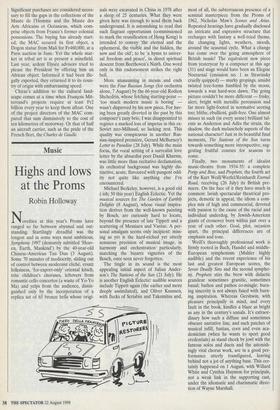Music
Highs and lows at the Proms
Robin Holloway
Novelties at this year's Proms have ranged so far between abysmal and out- standing. Startlingly dreadful was the longest and in some ways most ambitious, Symphony 1997 (demurely subtitled 'Heav- en, Earth, Mankind') by the 40-year-old Chinese-American Tan Dun (3 August). Some 70 minutes of mediocrity, sliding out of control between modernist cliché, ersatz folksiness, 'for-export-only' oriental kitsch, trite children's choruses, leftovers from romantic cello concertos (a waste of Yo-Yo Ma) and yelps from the audience, distin- guished only by the incorporation of a replica set of 65 bronze bells whose origi- nals were excavated in China in 1978 after a sleep of 25 centuries. What they were given here was enough to send them back underground. It is astonishing to read that such flagrant opportunism (commissioned to mark the reunification of Hong Kong) is intended to convey 'the eternal and the ephemeral, the visible and the hidden, the new and the old'; to be 'a hymn to univer- sal freedom and peace', in direct spiritual descent from Beethoven's Ninth. One word only in this endorsement strikes the right bell.
More unassuming in means and ends were the Four Russian Songs (for orchestra alone, 7 August) by the 66-year-old Rodion Shchedrin, whose fetching starting-point 'too much modern music is boring' wasn't disproved by his new piece. For hav- ing been greatly diverted in the past by this composer's zany brio, I was disappointed to register a marked loss of impetus in this ex- Soviet neo-Milhaud, so lacking zest. This quality was conspicuous in another Rus- sian-inspired premiere, Gerard McBurney's Letter to Paradise (28 July). While the main focus, the vocal setting of a surrealist love letter by the absurdist poet Daniil Kharms, was little more than recitative declamation, its orchestral background was highly dis- tinctive, acute, flavoured with pungent odd- ity not quite like anything else I've encountered.
Michael Berkeley, however, is a good old (-ish; 50 this year) English Eclectic. Yet the musical sources for The Garden of Earthly Delights (8 August), whose visual inspira- tion derives from the well-known painting by Bosch, are curiously hard to locate, beyond the presence of late Tippett and a scattering of Messiaen and Varese. A per- sonal amalgam seems only incipient: miss- ing as yet is the hard-etched yet utterly sensuous precision of musical image, in harmony and orchestration' particularly, matching the bizarre vignettes of the Bosch, once seen never forgotten.
The tingle in its sound is the most appealing initial aspect of Julian Ander- son's The Stations of the Sun (21 July). He is another English Eclectic: audible sources include Tippett again (the earlier and more deeply assimilated), and Oliver Knussen, with flecks of Scriabin and Takemitsu and, most of all, the subterranean presence of a seminal masterpiece from the Proms of 1962, Nicholas Maw's Scenes and Arias. Repeated hearings have gradually disclosed an intricate and expressive structure that recharges with fantasy a well-tried theme, the changing lights, weathers, moods, around the seasonal cycle. What a change has come over the going atmosphere of British music! The equivalent new piece from yesteryear by a composer at this age (31) and stage would have been an Elegiac Nocturnal (emission no. 1 as Stravinsky cruelly quipped) — murky gropings, amidst twisted tree-forms fumbled by the moon, towards a wan hard-won dawn. The going picture couldn't be more different — frisky, alert, bright with metallic percussion and far more light-footed in normative scoring too; blithe, ebullient, guilt-free. One almost misses in such (in every sense) brilliant tal- ents as Anderson and Ades the strain, the shadow, the dark melancholy aspects of the national character! Just in its beautiful final moments, The Stations of the Sun turns towards something more introspective, sug- gesting fruitful courses for seasons to come.
Finally, two monuments of idealist music-theatre from 1934-35: a complete Porgy and Bess, and Prophets, the fourth act of the Kurt Weill/Werfel/Reinhardt Eternal Road, receiving (26 July) its British pre- miere. On the face of it they have much in common: lavish spectacular theatrical pro- jects, demotic in appeal, the idiom a com- plex mix of high and commercial, devoted with passion to the cause of the racial and individual underdog, by Jewish-American giants of crossover born within just over a year of each other. Goal, plot, occasion apart, the principal differences are of emphasis and tone.
Weill's thoroughly professional work is firmly rooted in Bach, Handel and middle- European symphonism (Mahler highly audible) and the recent experience of his last and greatest European scores, the Seven Deadly Sins and the second sympho- ny. Prophets stirs the brew with didactic grandeur sometimes granitic, sometimes banal; bathos and pathos co-mingle; burn- ing sincerity is not always fused with burn- ing inspiration. Whereas Gershwin, with pleasure principally in mind, and every fault in the book, kindles a blaze as bright as any in the century's annals. It's extraor- dinary how such a diffuse and sometimes obscure narrative line, and such patches of musical infill, fustian, corn and even aca- demicism (when he wants to sport good credentials) as stand cheek by jowl with the famous solos and duets and the astonish- ingly vital chorus work, are in a good per- formance utterly transfigured, leaving behind not a jot of anything base. This cer- tainly happened on 1 August, with Willard White and Cynthia Haymon for principals, not a weak link in the supporting cast, under the idiomatic and charismatic direc- tion of Wayne Marshall.
























































 Previous page
Previous page